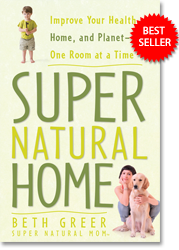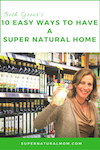 It’s time to start putting on sunscreen…or is it? There are lots of other options to protect yourself from getting burned this summer, like wearing protective clothing, finding shade, and avoiding noon sun. Plus, there’s no consensus that sunscreen prevents skin cancer and in some cases it’s been shown to actually increase your risk! If you do use sunscreen, make sure what you put on your skin is safe and effective.
It’s time to start putting on sunscreen…or is it? There are lots of other options to protect yourself from getting burned this summer, like wearing protective clothing, finding shade, and avoiding noon sun. Plus, there’s no consensus that sunscreen prevents skin cancer and in some cases it’s been shown to actually increase your risk! If you do use sunscreen, make sure what you put on your skin is safe and effective.
I love the sun, and when I was a teen I used to mix baby oil and iodine and rub in on my skin before I went to the beach. While this seems pretty foolish, some of the sunscreens on the market today aren’t much better. One great resource for information is the new 2010 Sunscreen Guide put out by The Environmental Working Group (EWG), a nonprofit research organization based in Washington, DC. Its scientists analyzed 500 sunscreens and reported that only 8%, or 39 were safe and effective. They found false advertising, unproven claims by manufacturers, and ingredients that haven’t been tested for safety.
Here’s what Jane Houlihan, EWG Senior Vice President for Research had to say: “Many sunscreens available in the U.S. may be the equivalent of modern-day snake oil, plying customers with claims of broad-spectrum protection but not providing it, while exposing people to potentially hazardous chemicals that can penetrate the skin into the body. When only 8 percent of sunscreens rate high for safety and efficacy, it’s clear that consumers concerned about protecting themselves and their families are left with few good options.”
EWG recommends the following when buying sunscreen:
- Don’t be fooled by high SPF. Anything higher than “SPF 50+” can tempt you to stay in the sun too long, suppressing sunburn but not other kinds of skin damage. The FDA says these numbers are misleading.
- Avoid Vitamin A-laced creams listed as “retinyl palmitate” on the label. New government data show that tumors and lesions develop sooner on skin coated with vitamin A.
- Avoid the chemical oxybenzone, a synthetic estrogen that penetrates the skin and contaminates the body.
- Look for active ingredients zinc, titanium, avobenzone or Mexoryl SX. These substances protect skin from harmful UVA radiation and remain on the skin, with little if any penetrating into the body.
- Skip sunscreens with insect repellent – if you need bug spray, buy it separately and apply it first.
- Avoid sprays and powders which cloud the air with tiny particles of sunscreen that may not be safe to breathe. Choose creams instead.
One of the most disturbing things I read in the EWG report was the use of the Seal of Approval from the The Skin Cancer Foundation (SCF) which is found on hundreds of sun protection products. SCF approval is easy: just document that your product has an SPF of at least 15 and pay a $10,000 donation to the Foundation’s Corporate Council. According to the EWG, “SCF-approved products are not required to protect from UVA rays.” In addition, 45 products using the SCF seal exceeded SPF 50+, which according to the FDA, is misleading consumers about how well these sunscreens protect from skin damage.
Sunlight is important for our health, so I try and make sure I get about 20 minutes a day of direct sun on my bare skin (arms, legs and torso), without sunscreen. This insures that I have enough Vitamin D, which is made in our skin as a result of exposure to sunlight. According to Michael Holick, M.D., Ph.D., and author ofThe Vitamin D Solution, vitamin D deficiency is one of the most commonly unrecognized medical conditions, leaving us at risk of developing not only osteoporosis and fractures but also “numerous serious and often fatal diseases, including several common cancers, autoimmune diseases, infectious diseases and heart disease.” Your doctor can test your D level with a blood test and recommend supplements if necessary.
So get out in the sun this summer, don’t get burned, and use a safe sunscreen when necessary. The best way to protect yourself and the planet is to choose products from companies known for their purity and integrity. Unless our concern grows for what we’re putting on our skin, truly natural products won’t have a fighting chance to survive in the market. It’s important to support products from trusted cosmetic and body care companies that use natural, certified organic, nontoxic and non-synthetic ingredients.
Beth Greer, Super Natural Mom™, is the bestselling author of Super Natural Home, host of “Your Super Natural Life” on Clear Channel’s Green 960 Radio, and impassioned champion of toxin-free living who busts open the myth that our homes are safe havens. Follow Beth on Twitter. Become a fan on Facebook.
(Photo Credit: United Press International)


